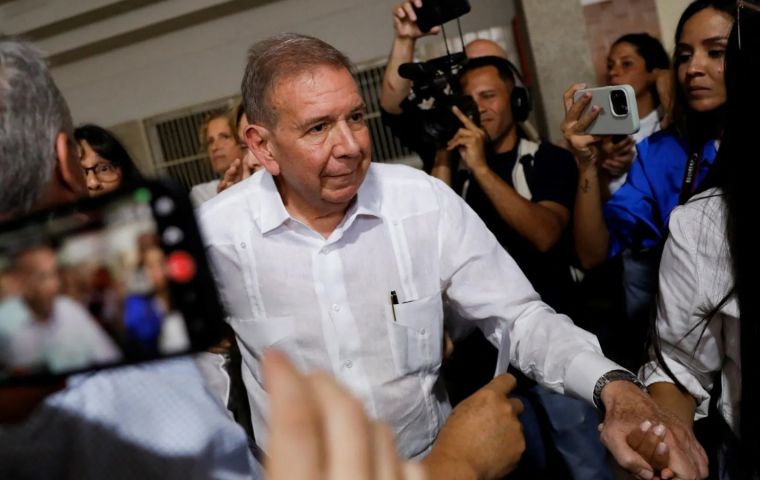MercoPress. South Atlantic News Agency
Venezuelan opposition leader Edmundo González arrives in Spain after receiving political asylum
 González’s departure was made possible through a coordinated diplomatic effort involving the Netherlands and Spain
González’s departure was made possible through a coordinated diplomatic effort involving the Netherlands and Spain Edmundo González Urrutia, a prominent Venezuelan opposition leader who was elected, to many in the international community, as the legitimate winner of the July 28 presidential election, arrived in Spain this Sunday after being granted political asylum by the Spanish government. González had sought refuge at the Dutch Embassy in Caracas before securing his passage out of the country.
González's escape marks the culmination of weeks of diplomatic negotiations, which allowed him to flee Venezuela amid mounting pressure from the Chavista government. “González has requested the right of asylum, and Spain is, of course, going to grant it to him,” Spanish Foreign Minister José Manuel Albares confirmed. Albares emphasized that the asylum request came at González’s initiative, not Spain’s, and noted that González had expressed his gratitude for Spain’s assistance.
The political climate in Venezuela has grown increasingly hostile for opposition figures. González, who represented opposition leader María Corina Machado in the recent elections, faced severe persecution from the Venezuelan justice system, which accused him five days ago of various crimes related to his presidential candidacy and the outcome of the elections. Fearful for his safety and that of his family, González made the decision to flee the country after weeks of evading arrest.
Machado declared this Sunday that Edmundo González Urrutia was forced to flee Venezuela due to a “brutal wave of repression” unleashed by the Chavista regime following the July 28 elections. Machado affirmed that on January 10, 2025, González Urrutia “will be sworn in as the constitutional president of Venezuela and commander-in-chief of the National Armed Forces.” In the meantime, she emphasized, “Edmundo will continue to fight from abroad alongside our diaspora, and I will keep fighting here, alongside all of you.”
A los venezolanos,
— María Corina Machado (@MariaCorinaYA) September 8, 2024
Edmundo González Urrutía, Presidente electo de Venezuela ha salido del país y se encuentra en España.
A partir de nuestra histórica victoria del 28 de julio de 2024, el régimen desató una brutal ola de represión en contra de todos los ciudadanos,…
The July election was marred by controversy. Although Venezuela’s National Electoral Center (CNE), controlled by the Nicolás Maduro government, declared Maduro the winner, it did not release the official minutes of the election, as required by law. Meanwhile, opposition activists independently gathered results that showed González winning by a significant margin. Despite demands from the international community, including the United States, for transparency, Maduro’s government has yet to provide any documentation to support its claim of victory.
González’s departure was made possible through a coordinated diplomatic effort involving the Netherlands and Spain, with former Spanish President José Luis Rodríguez Zapatero reportedly playing a key role in the negotiations. His flight from Caracas to Madrid was facilitated by the Spanish Air Force, which flew him and his wife to Spain via the Dominican Republic and the Azores Islands. Upon arrival at the Torrejón de Ardoz Air Base in Madrid, he was met by Spanish officials who will oversee the asylum process.
En ese avión, Edmundo González y su esposa Mercedes López llegan a España como exiliados políticos.
— Alejandra Oraa (@alejandraoraa) September 8, 2024
Mucho ha pasado en las últimas horas en Venezuela. Aquí te resumo lo que se sabe hasta ahora (12:40 PM):
- Edmundo González ya está en España en calidad de asilo. Llegó el… pic.twitter.com/fTFw1PzCsl
In a statement following González’s arrival, Spanish Prime Minister Pedro Sánchez praised the opposition leader, calling him a “hero” and reaffirming Spain’s commitment to defending the political rights of all Venezuelans. Sánchez also criticized the Maduro regime, stating that Spain would not recognize any victory until the election minutes were made public. “Spain demands a peaceful and genuine solution for Venezuelans,” Sánchez said during a meeting of the PSOE Federal Committee.
Venezuelan Vice-President Delcy Rodríguez confirmed González’s departure on social media, claiming that the government had issued “safe-conducts” to ensure political peace in the country. However, many view González’s departure as a sign of the increasingly authoritarian nature of Maduro’s regime, which has arrested over 2,000 individuals accused of “terrorism” following the election.
González (75) is unsure whether he will ever return to Venezuela, where he had once planned to spend the rest of his life.




Top Comments
Disclaimer & comment rulesCommenting for this story is now closed.
If you have a Facebook account, become a fan and comment on our Facebook Page!